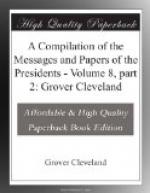By the act of the 3d of March, 1849, a board was constituted to make arrangements for taking the Seventh Census, composed of the Secretary of State, the Attorney-General, and the Postmaster-General; and it was made the duty of this board “to prepare and cause to be printed such forms and schedules as might be necessary for the full enumeration of the inhabitants of the United States, and also proper forms and schedules for collecting in statistical tables, under proper heads, such information as to mines, agriculture, commerce, manufactures, education, and other topics as would exhibit a full view of the pursuits, industry, education, and resources of the country.” The duties enjoined upon the census board thus established having been performed, it now rests with Congress to enact a law for carrying into effect the provision of the Constitution which requires an actual enumeration of the people of the United States within the ensuing year.
Among the duties assigned by the Constitution to the General Government is one of local and limited application, but not on that account the less obligatory. I allude to the trust committed to Congress as the exclusive legislator and sole guardian of the interests of the District of Columbia. I beg to commend these interests to your kind attention. As the national metropolis the city of Washington must be an object of general interest; and founded, as it was, under the auspices of him whose immortal name it bears, its claims to the fostering care of Congress present themselves with additional strength. Whatever can contribute to its prosperity must enlist the feelings of its constitutional guardians and command their favorable consideration.
Our Government is one of limited powers, and its successful administration eminently depends on the confinement of each of its coordinate branches within its own appropriate sphere. The first section of the Constitution ordains that—
All legislative powers herein granted shall be vested in a Congress of the United States, which shall consist of a Senate and House of Representatives.
The Executive has authority to recommend (not to dictate) measures to Congress. Having performed that duty, the executive department of the Government can not rightfully control the decision of Congress on any subject of legislation until that decision shall have been officially submitted to the President for approval. The check provided by the Constitution in the clause conferring the qualified veto will never be exercised by me except in the cases contemplated by the fathers of the Republic. I view it as an extreme measure, to be resorted to only in extraordinary cases, as where it may become necessary to defend the executive against the encroachments of the legislative power or to prevent hasty and inconsiderate or unconstitutional legislation. By cautiously confining this remedy within the sphere prescribed to it in the cotemporaneous




